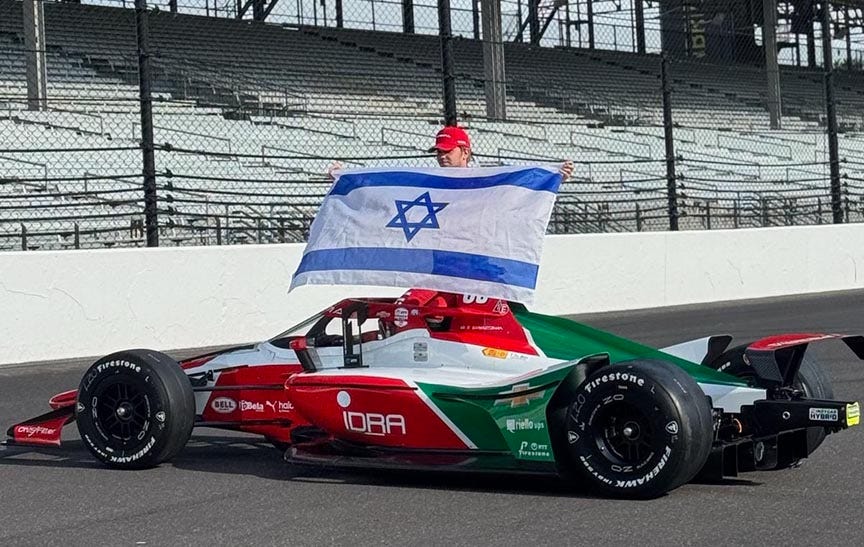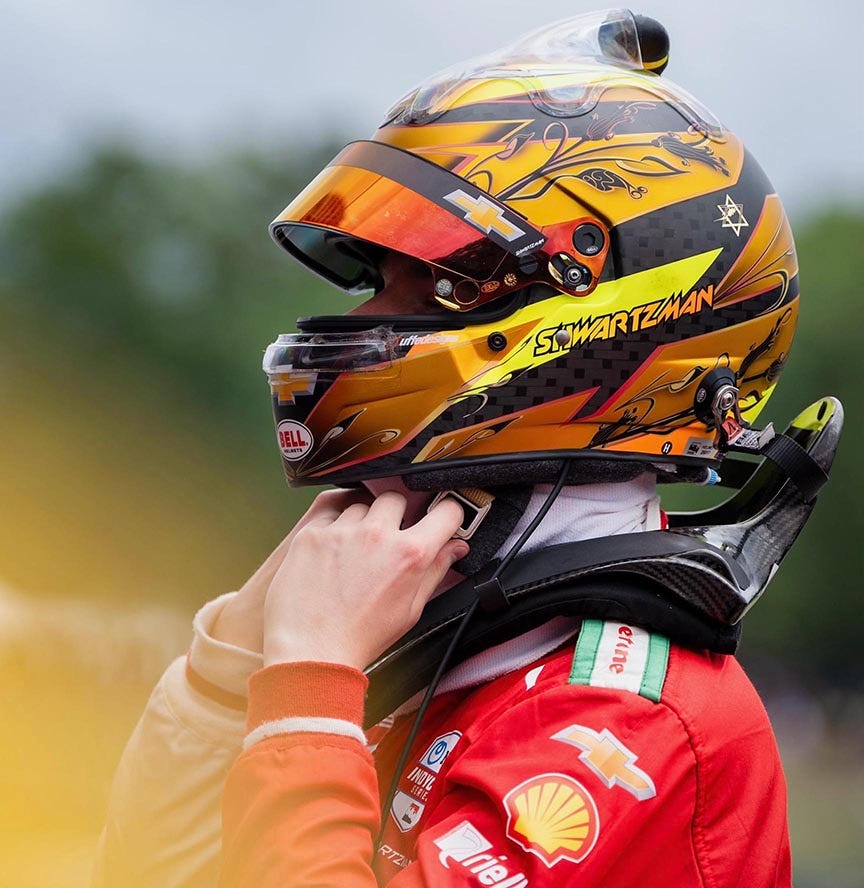First-ever Israeli IndyCar driver stuns racing world with pole position at Indy 500
Photo courtesy PREMA
For Robert Shwartzman, the first-ever Israeli driver in the IndyCar series, the beginning of his rookie season has been a steep learning curve.
The 25-year-old Tel Aviv native is learning fast. On May 18, Shwartzman stunned the racing world as he took the pole position for the May 25 Indianapolis 500, one of the most prestigious races in the world. He, too, thought it was an “unbelievable” result in what he called “the most intense qualifying I have ever done.”
Shwartzman is one of two drivers for PREMA, an Italian team that is making its entry into IndyCar this year.
After five races, Shwartzman is 24th overall in the standings, with two 18th-place finishes as his best results. After leading the three rookies for Rookie of the Year, he fell behind by two points in the Sonsio Grand Prix on May 10. With all that, he really wasn’t in the conversation going into qualifying at Indianapolis.
Making the feat even more astounding, this is Shwartzman’s first race on an oval track. He got a taste of it in April at the Indy Open Test practice session at the Nashville Superspeedway, but this weekend he will have to quickly learn how to navigate an oval in traffic.
He said he had fantasized about winning the pole position in Indianapolis, but then would tell himself “get back to reality, you have a new car, a new team, you are rookie. How can you expect to be in this position?”
Shwartzman is the first rookie to take the pole since Teo Fabi in 1983. There have been Jewish drivers at Indy on occasion, with Mauri Rose as the best known, having won the Indy 500 three times — in 1941, 1947 and 1948. Peter Revson, who referred to himself as “half-Jewish,” came in second in the 1971 Indianapolis 500.
Challenging first season
It hasn’t been an easy debut in the No. 83 Chevrolet, as a rookie driver with a team that just entered IndyCar. His first race was marred by radio and communication issues, which continued beyond qualifying into the race itself.
At his second race, in Thermal, Calif., before he could finish his first lap in the first practice, his car caught on fire and he had to jump out in the middle of the track. The fire damaged the car beyond repair, so the team had to use a spare chassis and work around the clock to build him something he could drive in the actual race.
After a relatively normal race on April 13 in Long Beach, Calif., where he finished 18th, he hoped that they had made progress to be in a position to battle the top teams. “We don’t have the experience, we don’t have the knowledge of teams that have done this for years,” he said. But it “feels like we have more things under control” as the season progresses.
But though the Birmingham race on May 4 started out well, a slow pit stop was just the beginning of a series of challenges, including a lack of grip on the tires. He had additional equipment issues during qualifying in Sonsio.
His time in Indianapolis started much the same. On the first day of practice at Indy, he was able to complete only six laps. He was able to drive much more on the next two days, but was toward the bottom of the standings. Then on May 17, he made the Fast 12, placing sixth, which he was already calling “legendary” for him. On May 18, he posted a four-lap average of 232.79 miles per hour, winning the pole.
He explained that during the first couple of days, many teams were doing race runs, while he was focused less on speed than on quality runs, figuring out how to fine-tune the car’s capabilities for qualifying at the end of the week.
Robert Shwartzman’s helmet includes a Star of David with “77” inside. Photo courtesy PREMA
Racing for his father
While Shwartzman was born in Tel Aviv, he spent his first couple of years in Ashkelon. When he was 4 years old, his family moved from Israel to St. Petersburg. His father, Mikhail, had wanted to become a racing driver, but since that did not happen, “he wanted a son and bring him into the racing world.”
He became fascinated with racing early on, racing karts at age 4. Two years later they moved to Italy to continue his karting career. He won numerous titles around Europe, then at age 14 started single-seat racing in the F4 Series, moving up the levels and zooming up the standings.
“I loved cars, loved racing,” Shwartzman said. His father “just gave me this opportunity… I’m here thanks to him.”
His father, who died of Covid in April 2020 at age 52, was “my biggest supporter, my biggest fan.”
In 2017 he joined the Ferrari Driver Academy and began racing for PREMA that December. He won the FIA F3 Championship in 2019, and finished second in the FIA F2 Championship in 2021 before being signed by Scuderia Ferrari in F1 where he served as their test and reserve driver from 2022 to 2024.
Being able to bring the Israeli flag into Formula 1 “was really big for me… in a Ferrari car, that was a special moment.”
When Italian team PREMA decided to field their first IndyCar team in America, they selected Shwartzman, given his experience in F1 and Endurance racing. In 2024, he won the Lone Star Le Mans event in Austin, Tex., as part of the World Endurance Championships. Since he had been unable to break into F1 as a regular driver, he decided to give IndyCar a chance.
In IndyCar, “I really want to make the team and the car good, so we can bring the Israeli flag up to the top.”
For years, Shwartzman had been driving under a Russian license. In 2022, following Russia’s invasion of Ukraine, the Federation Internationale de l’Automobile barred drivers from competing under a Russian flag. While most went with a neutral flag, Shwartzman reclassified as an Israeli.
While Israelis in many public arenas often have to contend with hostility, especially since the Hamas invasion of Israel 18 months ago, Shwartzman said he hasn’t seen much of that. “I just focus on myself, my job,” he said. He knows it is around, but his view is “keep working and don’t get disturbed by that.”
Instead, he works to improve himself so that when he wins a race, it will “speak louder than words.”
He said the response from fans in the United States has been positive. “Here in the U.S., people are way less judgmental. I've never felt that anybody would judge from where I come from, they just judge what you do.”
In Europe, in the last couple of years “it was a bit more tense for me,” he said. While some people supported him, “there were also some people that were going against me” because of where he was born.
In February, the Israeli Consulate in Atlanta held a reception with Shwartzman, where he said “I just want to win races and raise the Israeli flag, to show that Israel is still here, and to inspire everyone with the resilience of the Jewish people.” His helmet has a Star of David with a “77” for Israel’s 77th birthday.
The consulate also co-hosted a reception at the Barber Motorsports Park in Birmingham the weekend of his race there, with the local Jewish community and the Alabama-Israel Legislative Caucus.
Florina Newcomb, interim director of the Birmingham Jewish Federation, said the day was “a beautiful reflection of the deep and enduring bonds between Alabama and Israel, built on shared values, friendship and mutual respect.”
Alabama Attorney General Steve Marshall also spoke at the event. Last fall, when a Palestinian group put up a billboard near the University of Alabama at Birmingham, his campaign responded by buying several pro-Israel billboards in the area.
A state resolution honoring Israel’s 77th birthday was presented to Shwartzman and Israel Consul General Anat Sultan-Dadon. She thanked Shwartzman, saying “at a time when Israel is under attack, not only on the ground in Israel but in the international stage in so many places around the world, including sometimes here in the United States, I thank you for carrying the Israeli flag with pride, because you represent the Israeli strength, resilience and the spirit of the Israeli people.”
Pastor Brandy Gibson, state co-chair for Christians United for Israel, presented a proclamation declaring May 4 as Robert Shwartzman Day in Alabama.
At a press conference after winning the pole, when asked about the situation in Israel, Shwartzman spoke of world unity. “I just want peace in the world,” he said. “I want people to be good, and I don’t want the separation of countries, saying, ‘This is bad country. This is good country.’ There is no bad or good. We’re all human beings, and we just have to be good.”
He said he is a strong believer in negotiating and finding a “gold middle,” and that “I really hope that at the end of the day everything's going to be good in the world.”
He also would like to see a track built in Israel so international races could be held there. “It would be amazing if we would go to Israel.”
Though he will start in pole position on May 25, he is tempering expectations, given that this is his first race in an oval and he needs to learn how to overtake and how to defend on that type of track. He will look at what other drivers are doing and learn from them, because mistakes at Indy “can cost a lot,” and he looks to “just be in a decent position” and “try to enjoy the battling, the racing with other guys.”







